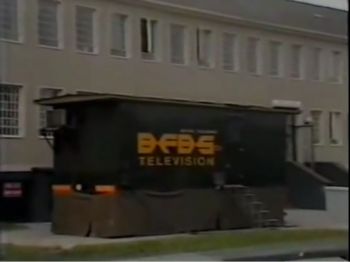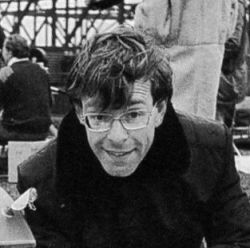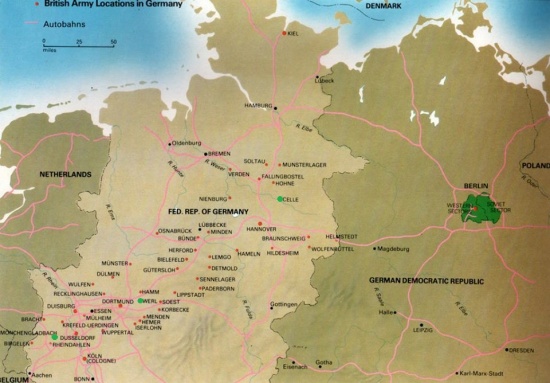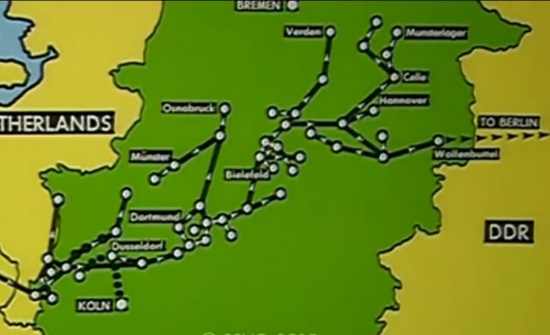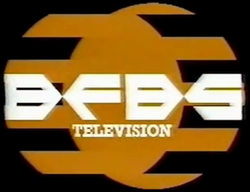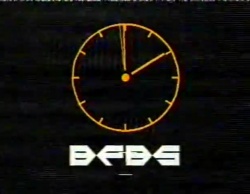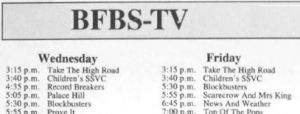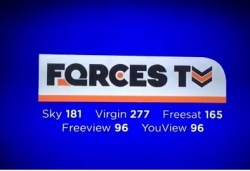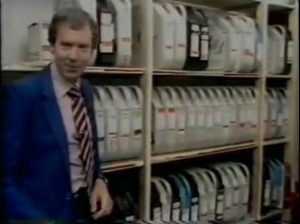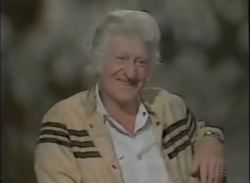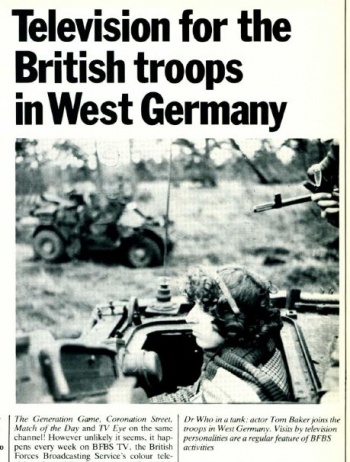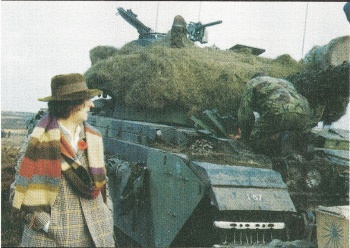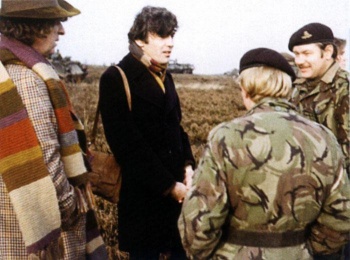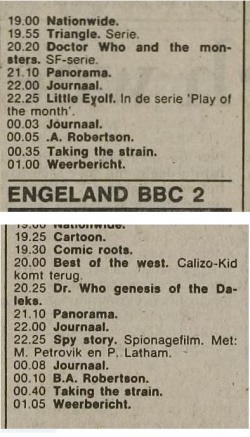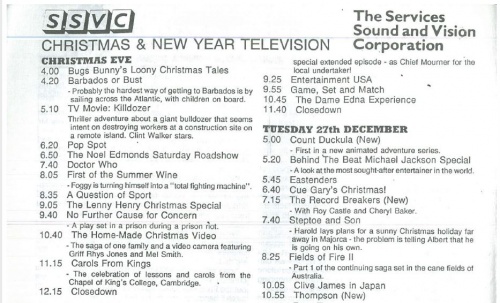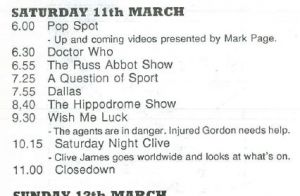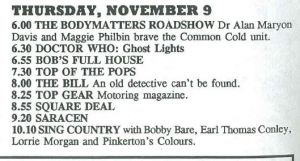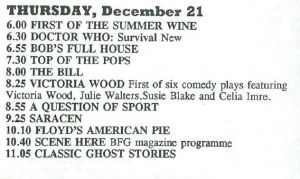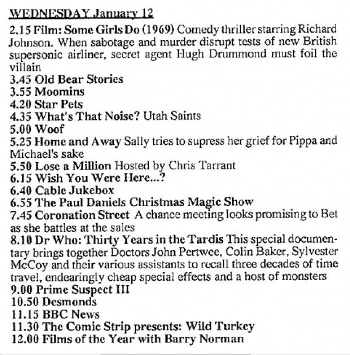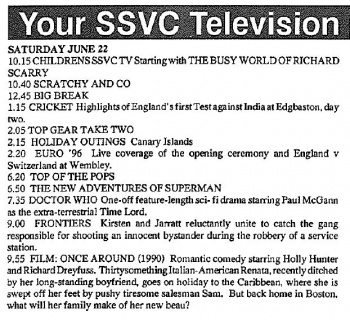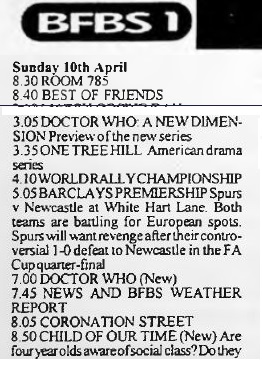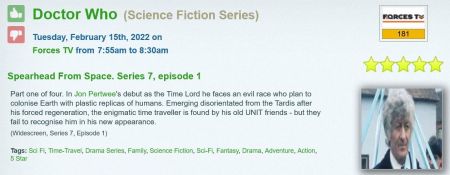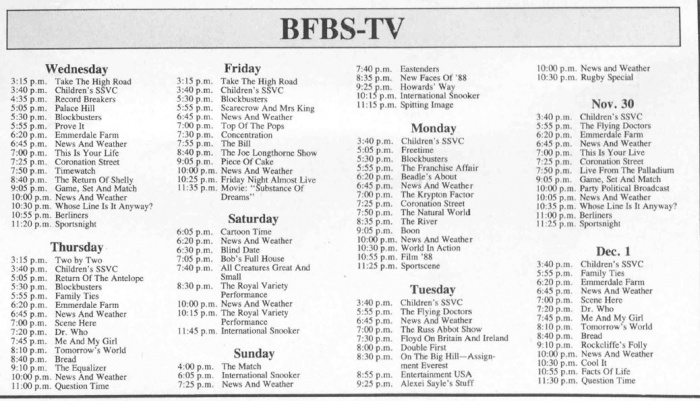British Forces Broadcasting Service
Profile
| Country Number (N/A) | |
| Region | Europe, South America, Atlantic Ocean |
| Television commenced | 18 September 1975 |
| Colour System PAL | 18 September 1975 |
Television Stations / Channels
[This page displays best with the Table of Contents in "Hide" mode]
The BRITISH FORCES BROADCASTING SERVICE - aka BFBS / SSVC is a dedicated radio and television provider for British Forces personnel and their families serving and living abroad.
It was initially broadcast in parts of West Germany, then later in the Falkland Islands, Cyprus, Gibraltar and elsewhere.
This profile primarily covers the Germany and Falklands screenings only. (See the relevant profile pages for the other countries.)
This coverage is significantly longer than those of the other foreign TV stations usually as presented on BroaDWcast, but the context into which Doctor Who was shown on the network warrants a far more detailed profile.
THE BFBS
The "British Forces Experimental Station" (BFES) was a radio service established on 23 November 1943, which commenced transmission from 1 January 1944, providing English broadcasts to British servicemen posted with their families in Algiers in Algeria. Although it was created at the behest of the Ministry of Defence, it operated independently of the MOD.
Over the next 20 years, the service -- which adopted the new identity the "British Forces Network" (BFN) -- continued to grow as further radio stations were established at various British military and air force bases located across Europe, the Middle East and Asia. In 1961 it had been renamed the British Forces Broadcasting Service (BFBS).
After many years of planning and several false starts, a television service for the forces in the British Sector of West Germany (aka British Army of the Rhine (BAOR)) was finally given the go-ahead in October 1974 and set-up planning began in April 1975, with ITV winning the contract for administering the project. The new television service was to act chiefly as a morale-booster for the families of British servicemen, many of whom had at that time been deployed to Northern Ireland during the conflict known as "The Troubles".
What was the B.A.O.R.?
At the end of the Second World War, Germany was divided into four Zones, each controlled by one of the occupying Allied powers. The "British Sector" was the northwest region of the country, the "US Sector" was in the southeast, the "French Sector" in the southwest, and the "Soviet Sector" was the northeast. The city of Berlin (within the Soviet Zone) was also divided, with the western 'half' controlled by the US, British and French Zones, and the eastern 'half' by the Soviet Zone. The nervous political tension that emerged between what was now West Germany (the French, US and British side) and East Germany (the Soviet side) became known as the Cold War.
The British forces serving in West Germany were dubbed The British Army of the Rhine (BAOR) - named for the river that ran through the British Zone. As the Soviet threat in the East increased, BAOR became less of an occupational army, and with the aid of the other Allied powers, assumed the role of defenders of Western Europe.
The divide between West and East Germany lasted until 1991 with the collapse of the Soviet Union. The wall that had divided Berlin since August 1961 was torn down in November 1989, and Germany once again became a unified nation.
No longer needed, the BAOR was later disbanded, and troops were redeployed elsewhere (many to Yugoslavia in the early 1990s), while the dozens of military barracks across the former West Germany were repurposed.
BFBS-TV PHASE ONE - CELLE
BFBS Television was in operation only five months after it was proposed; broadcasts commenced at 7pm on Thursday, 18 September 1975 from a 30 foot purpose-built mobile trailer located at the BAOR garrison of Trenchard Barracks near the town of Celle, near Hannover (Hanover).
Celle had been selected as it was in the northern-most region of the country manned by BAOR, with the network to be extended over the next two years in a herringbone fashion 'backwards' across the sector in a south-westerly direction towards BAOR Headquarters in Mönchengladbach near the border with the Netherlands.
To begin with, the coverage area had a very limited range and restricted to only six hours per day (later extended to eight). It was a 625-line PAL colour signal, transmitted on a weak UHF low-band frequency so as not to interfere with local German stations also broadcasting in PAL, but mainly to ensure that locals could not tune into the signal illegally (although German residents bought converter kits to tune their TVs to pick up the BFBS signal, even though doing so was a breach of copyright laws!). It was colloquially known as "Cellevision", and initially had an audience of only 1,400.
Programming was provided by way of video-taped recordings of ITV and BBC transmissions out of London (for ITV, this was London Weekend Television and Thames TV only), with the 2-inch quad tapes flown out on a weekly basis, and broadcast a few weeks later. (See Origins of the Tapes below.)
For the first eight months, all programmes were recorded at London Weekend Television's (LWT) head office at Kent House on the South Bank. A new base of operations - the London Control Centre (LCC), with a studio and specially-equipped recording and broadcasting facilities - was established on the ground floor of LWT's Fountain Studios at Wembley in London; it was in operation by May 1976.
All the in-vision continuity announcements were also pre-recorded at the Wembley studios, with the tapes flown over to Germany and played between programmes as if "live".
All the out-of-vision announcements were however performed from the mobile unit itself. 15 months before finding fame as the voice of K9 in Doctor Who, actor John Leeson briefly worked in Celle as an announcer for the fledgling TV station. He was contracted for two separate relief shifts during late 1975; being a civilian, he was accorded the rank of Captain!
Four additional BAOR garrisons all north of Celle joined the growing network from 7 July 1976 -- Hohne, Munsterlager, Fallingbostel and Soltau -- completing Phase One of the operation; this increased the viewership to over 14,000.
BFBS-TV PHASE TWO - WERL
On 11 December 1978, once Phase Two was underway and more than 20 additional sites had been connected to the network after the addition of more TV transmitters (installed onto the sector-wide array of existing radio towers), the mobile unit was relocated to a more suitable 'input' position in the south west, at the Military Police Vittoria Barracks in Werl; this move was carefully timed to ensure that the soon to be doubled viewership received all the forthcoming BBC and ITV Christmas programming.
Between 10 August and 24 October 1979, ITV went "dark" due to strike action. With the LWT studios out of action during this period, BFBS had lost the means to record any new programmes; with its stockpile of already-recorded programmes slowly dwindling, London-based BFBS staff borrowed broadcast-quality recording equipment and taped programmes at home!
It's not known if these obliging staff members were instructed to record Doctor Who. If they didn't, BFBS viewers did not get to see Destiny of the Daleks and City of Death.
By 1980, limited television services had also been established at the RAF bases in Sardinia and Belize (Airport Camp (APC)).
The Royal Navy was also provided with VHS tapes for showing on its ocean-going vessels.
It's not known if Doctor Who was included in the tapes delivered to these locations.
BFBS-TV PHASE THREE - JHQ / NETHERLANDS
On 4 July 1980, the mobile unit was moved for a second and final time, from Werl to the BAOR Headquarters at Mönchengladbach. The Army and RAF Joint Headquarters at Rheindahlen (JHQ) was strategically positioned in readiness for the final stage of the network's expansion: the completion of the microwave link with London.
The new brown and white stylised "BFBS" logo that was adopted at this time was designed by BBC graphic designer Sid Sutton.
From late 1980 / early 1981, viewers in the border regions of the Netherlands could pick up BFBS from Mönchengladbach or from garrisons such as Birgden and Geilenkirchen in the lower south-west of the British Sector.
The south-eastern Dutch province of Limburg was able to receive the BFBS signals on local channels 40, 49 and 50, albeit illicitly, and as such special inverters were required to convert the scrambled audio. And since channel 40 was also used by the German station SW3, to pick up the BFBS signals, Dutch viewers could tune in by angling their TV aerials horizontally. A few years later, BFBS was formally available in Limburg and other provinces via the country's growing cable and antennae network.
At first, the Dutch newspapers were not permitted to publish the BFBS listings, however this restriction was eventually lifted, and regional papers (such as Limburgsch Dagblad - see below) began publishing the military channel's TV schedules from late August 1982 onwards.
Meanwhile, work had commenced on the construction of a new purpose-built broadcasting complex at JHQ; it was completed in September 1981. The mobile unit that had served the network for five years was decommissioned. With JHQ as the new broadcast centre, and transmissions now reaching Wildenrath, Bruggen and Laarbruch by 1982, the total viewing audience of BFBS-TV in West Germany increased to well over 110,000. Work was also well underway on completing the microwave relay link.
On 1 April 1982, BFBS was privatised and merged with the Services Kinema Corporation - which distributed theatrical films to the BAOR - to form the independent charity organisation, "The Services Sound and Vision Corporation" (SSVC). Although under a new identity, the TV service continued under the "BFBS-TV" name for a while. (We will continue to use "BFBS" in this profile for simplicity.)
MEANWHILE, ON THE FALKLAND ISLANDS…
With SSVC now on board, the BFBS began to provide entertainment in regions beyond West Germany.
Civilian residents on the Falkland Islands had TV entertainment in the form of commercial tapes of feature films available from a local video rental store. Residents had either NTSC or PAL capable TV sets (PAL sets were imported from Argentina).
The British Royal Navy had a small garrison at Port Stanley, while the Royal Marines had barracks at Moody Brook and Government House. The SSVC began providing these military bases with a weekly supply of VHS tapes of BBC and ITV programmes. (If Doctor Who was part of the package of supplied tapes, episodes from Season 19 featuring Peter Davison would likely have been the first to be available.)
On 2 April 1982, Argentine troops landed on the island and seized control. A week later, the Argentine began TV transmissions, broadcasting a mixture of Spanish and English programmes to the residents as part of the propaganda agenda. The programme content was said to be from a private collection of video tapes stolen from the vacated Government House.
During this period of conflict - known as Falklands War (2 April to 15 June 1982) - the SSVC had the tapes intended for the onshore sites redirected to the Task Force ships protecting the Islands. The tapes were initially shared between the fleet's vessels HMS Hermes, HMS Invincible, and HMS Fearless, then passed on to other British naval craft whenever possible.
After the hostilities had ended, and the islands were once again under British protection, the garrisons and navy vessels that stayed on to protect the islands continued to receive a regular supply of tapes from BFBS.
The construction of a new permanent airbase at Mount Pleasant on the larger eastern island began in October 1983…
LONDON MICROWAVE LINK COMPLETED
For a number of years, the only English-language television service available to British servicemen stationed in West Berlin was the US American Forces AFRTS AFN-TV network (an NTSC colour service established in 1971). But BFBS became available in the British Sector of the city in late 1982, but one needed to purchase a PAL television set or converter to view it.
An additional television service to the British Sector in West Berlin was later installed via a cable link. The signal was encrypted to prevent "interception" by local stations. (This link became redundant and ceased operating in 1994, following the fall of the Berlin wall in November 1989 and later unification of the city.)
The UK to West Germany microwave-radio relay system was completed by 13 December 1982, linking JHQ with the BFBS's base in Wembley. With this in place, it was the longest one-way microwave link in the world; it crossed through France, Belgium and the Netherlands to the base at Rheindahlen, from where the signal was beamed to garrisons through the herringbone chain of 45 line-of-sight radio towers crossing British Sector West Germany.
The live feed from London was initially limited to just news and sports coverage. (Due to the one-hour time difference, the 5.45pm ITN News and the BBC's Nine O'Clock News were seen "live" in West Germany at 6.45pm and 10pm respectively.) All other programming was still played from imported video-tape.
In 1984, BBC Enterprises beat out LWT by open tender and won the £1 million a year contract to supply BBC and ITV programming to BFBS Germany, commencing in 1986. The exclusive contract had previously been held by LWT since the service was established in 1975. (The Doctor Who episodes to be supplied under this new contract would have been Season 23 onwards.)
From September 1985 the network was rebranded as "SSVC Television", an identity it retained until 1997. But for simplicity, we shall continue to also refer to the station as BFBS throughout this profile.
BFBS-TV COMES TO THE FALKLANDS
Meanwhile on the Falkland Islands ... RAF Mount Pleasant Airfield (MPA) was inaugurated in May 1985, but it wasn't until the end of 1986 that the British forces moved in permanently. With a now vastly-increased military presence on the islands (prior to the 1982 war, the total island population was under 2,000), SSVC brought broadcast television to the colony. This was a PAL colour system, incompatible with the NTSC sets that many residents had acquired before and during the war.
The first terrestrial transmissions were on 4 December 1986; the signal range was limited to only a small radius around Mount Pleasant Airfield, but was also freely available to the few civilian residents living in close vicinity -- or at least those who had PAL compatible sets.
Two years later, an illegal privately-owned repeater tower was erected on Sapper Hill to relay the signals from MPA to Port Stanley, the island capital situated at the eastern-side of East Falkland. However this was quickly shut down by the government, as it was considered a breach of international copyright because the American programmes being shown by BFBS hadn't been cleared for a wider civilian audience. One solution was to install a 'timer' which would switch off transmissions whenever American programmes were being broadcast.
Eventually, SSVC made a deal with the US distributors to enable wider broadcasts to continue. Broadcast television was still only available to residents near MPA and in Stanley (although an "illegal" tape-swapping arrangement may have been utilised by those residents living in other parts of the islands).
BFBS EXPANDS FURTHER - CYPRUS
During the 1980s, SSVC/BFBS established further terrestrial TV stations elsewhere, such as on Cyprus. This channel (which was also supplied with pre-recorded programmes on video tape) was initially freely accessible by anyone on the island -- that was until April 1997, when the signal was encrypted so it was no longer available to unauthorised viewers. (The service was accessible mainly in Episkopi Akrotiri and Dhekelia; the station turned off its analogue signals and switched exclusively to digital satellite in January 2009.)
By the late 1980s, BFBS-TV broadcasts reached more than 50 sites throughout the western central and northern regions of West Germany via the herringbone layout network of microwave relay transmitters.
The 1990 edition of the World Radio Television Handbook lists just the following stations and channels: Münster (on channel 23); Lemgo (37); Geilenkirchen (40); Hannover (40); Bielefeld (41); Hildesheim (41); Mülheim (41); Minden (41); Berlin Westend (41); Enger (42); Gütersloh (44); Hameln (44); Osnabrück (48); Paderborn (49); Wassenberg (49); Celle (51); Herford (52); Niederkrüchten (53); Hamm (55); Wolfenbüttel (56); Düsseldorf (57); and Mönchengladbach / Hehn (59).
NEW HQ - CHALFONT ST PETER
From November 1991, the system input point for BFBS television moved from JHQ Rheindahlen to the new SSVC studio and transmitter complex at Chalfont St Peter in Buckinghamshire (a repurposed Victorian mansion), with all BBC programmes and links now beamed "live" to Germany, Cyprus and elsewhere via satellite. ITV programmes still had to be pre-recorded first then edited before being beamed to the BFBS channels.
Although the weekly shipment of video-tapes to Germany had ceased, the BFBS station on the Falkland Islands continued for a few more years to receive pre-recorded programming before it too linked up via satellite. (See Fate of the Tapes below.)
By 1992, BFBS-TV continued to be available via satellite to its stations in Europe - now including Gibraltar - with the direct feed from London available in the Falklands by August of that year. Naval vessels continued to receive a regular supply of VHS tapes.
From 1986 to 1996, the live links for the week-day kid's afternoon show "Children's SSVC" (which commenced at 3.40pm) was presented by Debbie Flint, Jeff Moody, Russell Hearn and Fred Harris. The links were recorded in a tiny studio, using a single camera with autocue.
(For some of that time through until the end of 1990, Flint was also working as a regular host on the British Satellite Broadcasting's Galaxy channel. Between April and December 1990, BSB aired a number of William Hartnell stories, and Flint co-hosted the station's special two-day "Doctor Who Weekend" in the September of that year.)
The Children's SSVC links were seen in West Germany and Cyprus.
Starting in late 1993, a new host was brought onto Children's SSVC: her name was Sophie Aldred.
The former Doctor Who star worked as a presenter on a part-time basis, usually making the long trip by car from South East London to Chalfont St Peter one or two times a week. She alternated with Debbie and the other presenters, doing the afternoon sessions.
In 1994, the annual Rhine Army Summer Show (RASS) was held in Bad Lippspringe from 21-23 May. Aldred and fellow Children's SSVC presenter, Jeff Moody, attended the outdoor event, putting on live shows for the children.
Aldred continued to work for the station in a part-time capacity until around 1996.
SSVC IN YUGOSLAVIA
That same year (1996), the BAOR was officially disbanded. Many of the British troops stationed in Germany had already been redeployed to the former-Yugoslavia during the 1992-1995 Bosnian war, with some remaining after the conflict to act as a peace-keeping force; the BFBS continued to provide video-taped BBC and ITV entertainment to the relocated army during this time.
SSVC - THE 1990s and TODAY
By April 1997, SSVC Television was rebranded as "BFBS Forces Television" aka "BFBS Television", with the service continuing in Germany, Cyprus, Bosnia/Herzegovina, the Falkland Islands, Belize and Gibraltar.
SSVC / BFBS Forces TV continued to evolve over the next few years. Since 2001, there have been three branded stations: "BFBS-1", available internationally, showing programmes for general audience; "BFBS-2", available only in some areas (i.e. it wasn't initially available in the Falklands); while "BFBS Navy TV" beamed signals by military satellite to sea-bound Royal Navy vessels
From the early 2000s, BFBS-TV broadcast 24/7 on six channels via satellite from Chalfont, to reach UK military personnel throughout Europe, Cyprus, Turkey and the Middle East, as well as westwards to include bases in Canada and Belize, and south to the Ascension and Falkland Islands (where the signal was recorded on site for later playback) and to naval vessels around the world. (Some ships were still supplied with programmes on video-tape.)
From 2010 a couple of variant TARDIS police box props were erected in the grounds of BFBS HQ in Chalfont for publicity purposes -- one of which is still there to this day!
BFBS Forces Television celebrated its 40th anniversary in 2015.
ForcesTV
In June 2014, SSVC launched "Forces TV", a new channel about and for the British Armed Forces, containing a mixture of news reports, documentaries and features produced by BFBS, as well as classic television series. It was available on BFBS channel 9, Sky 181, Virgin 274, Freeview / YouView 96 and Freesat 165.
Forces TV screened a number of the Gerry Anderson series in recent years, and starting in February 2022, a run of select classic Doctor Who was shown in a repeat cycle. (See below.)
The station ceased broadcasting on 30 June 2022 when it lost its channel slot on Freeview.
General information (links) about BFBS:
- SSVC WEBSITE
- BFBS TV WEBSITE
- BFBS AVAILABILITY
- BFBS FREQUENCIES
- BFBS DOCTOR WHO
- BFBS Logos and Idents
DOCTOR WHO ON THE BFBS
Due to the unusual method by which the series was delivered to the network, the late 1970s and 1980s episodes of Doctor Who shown on the BFBS had their very first officially sanctioned 'foreign' broadcast in parts of West Germany!
BBC Records
Although the programmes were transmitted from and seen in parts of West Germany and West Berlin, then much later in the Falklands, Cyprus and elsewhere, the BFBS viewership was considered by agreement with the unions (such as Actors' Equity) to be an extension of the audience at home in the UK.
This agreement was mostly driven by BFBS's assurance that broadcasts would be encrypted and/or too weak to be picked up by civilian populations, although ultimately this wasn't strongly policed; many West German, Dutch and Falkland Island residents did tune in and watch BFBS 'illegally' by installing special receivers enabling them to watch the military channel, but reception was only clear if they lived no more than six kilometres from the transmission range of a military transmitter.
Because of this (loose!) arrangement, the BFBS got the programmes for free, or in some cases by paying only a nominal fee to cover residuals; this is why "BFBS" and "SSVC" are not recorded in any of the BBC's sales documentation. Also, BBC Enterprises, the BBC's commercial division, did not have any involvement with the service. The supply of tapes and programmes was all done 'in-house' by the BFBS without the BBC's direct participation.
Origin of the Tapes
The BFBS base in Wembley operated four 2-inch quad video-tape recorders, with two reserved for recording programming off ITV (initially just the London-based stations LWT and Thames Television), BBC1 or BBC2, with the other two machines used for editing ITV programming to remove commercial breaks (since BFBS was fully non-commercial) and trailers. Programmes were carefully selected to avoid timing overlaps of the two channels being recorded at the same time.
US programmes recorded off the UK channels needed to have special clearance from the US distributors if it could be arranged. (See comment above about the US clearances issues experienced by BFBS Falklands.)
Each tape cost £150 to buy and £25 to be delivered by air to Germany by the Army Postal Service. About 100 tapes were shipped to the BFBS West Germany each week: programmes were generally (but not always) rotated on a three-week cycle: recorded on week one, delivered in week two, and transmitted during week three.
Over 1,400 tapes were in use in total, with half in transit at any one time. Tapes were held at the BFBF tape library in Rheindahlen to await broadcast.
The BFBS never broadcast from film.
Opening Night Programmes
Two of the programmes shown on opening night were "The Benny Hill Show" and the "Miss United Kingdom 1975" pageant. The former had originally aired on ITV on 8 January 1975 but was then repeated on 25 August 1975, while the latter was shown by the BBC on 19 August 1975.
On the second night, the BFBS played the first episode of the 13-part BBC drama Quiller, which had debuted on 29 August 1975. All the other shows that screened on 18 and 19 September were also recent fare, having aired on ITV or BBC during August or September 1975.
Given that it's more than likely to be the August repeat of "Benny Hill" rather than the January screening that was recorded, these samples show that the BFBS started taping selected programming no more than a month ahead of its official launch. Therefore, the BFBS would not have pre-recorded any Jon Pertwee episodes (1970 to 1974) nor recorded Tom Baker's first series (28 December 1974 to 10 May 1975).
Hartnell / Troughton / Pertwee?
There have been many long-standing rumours that the early black and white episodes of Doctor Who may have been seen by the British Armed Forces or shown on the BFBS.
In DWM issue 187 (cover dated June 1992), it was reported that "some [of the black and white stories] could be picked up by Foreign Broadcast Stations, which would televise programmes in English to RAF and British Army bases as far afield as the Middle East".
The distributor of feature films to the British Forces was the Services Kinema Corporation, but they dealt solely with cinema releases and not television programmes, and as such 16mm prints of Doctor Who or any other BBC programme would not have been circulated by the SKC.
And since the BFBS's first TV network didn't commence until late 1975, and it only ever broadcast in PAL colour from video tape and not from film, the chances of 16mm prints of missing episodes turning up within the BFBS system are very remote to say the least.
This also eliminates any possibility that the ten Hartnell, Troughton and Pertwee film prints that turned up in Taiwan a few years ago got there via the BFBS.
And since BFBS-TV didn't exist when Jon Pertwee was the Doctor, none of his stories (1970 to 1974) were recorded for the service either. (We have seen reports online by people who say they watched Pertwee on the BFBS in the early 1970s, but for the reasons outlined above and below, this is clearly impossible.)
Other programmes featuring Jon Pertwee were definitely seen on the BFBS, as he was interviewed on the BFBS chat show "Take Five" at some point between February 1976 (when "Take Five" debuted) and the end of 1982 (see Media section below), but this was most likely to introduce BFBS viewers to his ITV series Whodunnit in 1976, 77 or 78. (His other best-known series Worzel Gummidge series was not shown on BFBS until 1986.)
As noted on the Ascension Island page, 16mm prints of The Sea Devils were found at the naval base there in the mid-1980s, but these may have been gifted to the Navy in return for their assistance during the making of that 1972 serial rather than being firm evidence that 16mm film prints of Doctor Who were regularly being distributed to the British Forces.
Transmission
TOM BAKER
Since BFBS-TV didn't commence broadcasting until September 1975, Tom Baker's first season (December 1974 to May 1975) would never have been shown.
If Doctor Who was included in the first batch of programming sent to Celle in late 1975, then the first serial to screen would have been Terror of the Zygons, which had launched Season 13 in the UK on 30 August 1975 -- OR it's possible that The Ark in Space, which had aired in the UK as a 70-minute edited-down omnibus repeat on 20 August 1975, was the first to be shown. (And this date does fall within the same weeks during which the aforementioned "Benny Hill" and "Miss United Kingdom" had been recorded.)
Season 13 (perhaps also including the December 1975 edited-down omnibus repeat of Genesis of the Daleks?) would potentially have been seen in Celle from late 1975 to mid-1976.
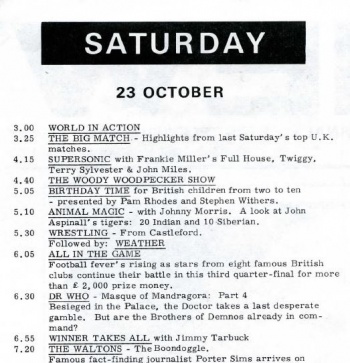
At some point after February 1976, Baker appeared on the BFBS chat show "Take Five", a popular irregular spot that took the form of a five minute interview with a celebrity who was shortly to appear on the BFBS. If Baker's appearance (which was recorded in London at the BFBS's studios in Wembley) was to introduce viewers to Doctor Who for the first time, as opposed to just promoting the start of the latest season, his episodes can't have aired prior to that date.
If Season 13 hadn't been shown, it's possible that the BFBS was able to screen the July 1976 BBC repeats of Planet of Evil and compilation of The Sontaran Experiment. (With Baker's "Take Five" appearance possibly airing ahead of part 1?)
While we are uncertain as to whether or not Season 13 and the later repeats aired, we know for certain that Season 14 did screen on the BFBS.
We have managed to track down a copy of the 23 to 29 October 1976 issue of VIEW, the BFBS's TV listings journal, and this has The Masque of Mandragora part 4 listed at 6.30pm on Saturday, 23 October 1976, which is only 4 weeks after its UK screening. (The synopsis in VIEW duplicated the one that had been in the Radio Times.)
With part 4 airing on that date, the season would have commenced on 2 October 1976. Allowing for the six-week transmission break between the third and fourth serials in the UK, the 26 episode run would have concluded on BFBS circa May 1977.
It's possible that the documentary Whose Doctor Who also aired on the BFBS in May 1977.
A GOOD MAN GOES TO BAOR
A 21-year old Thomas Stewart Baker lived in Germany whilst doing his National Service with the Royal Army Medical Corps; he was a hospital orderly at BMH Hostert near Mönchengladbach from 1955 to 1957. It was there that Private Baker was bitten by the acting bug. (Ironically, the old British Military Hospital was less than two miles north of JHQ Rheindahlen, later to be the site of BFBS's home-base!)
Two decades later, the actor Tom Baker returned to the country on a publicity visit, but now the lowly orderly was a Doctor.
In November 1977, Baker and producer Graham Williams took time off during rehearsals for The Invasion of Time to travel to Hannover, and to visit nearby British Forces schools -- and to take a tank or two for a spin!
(While the exact dates of his visit are not known, it was during at least one week day. And we can narrow down this further by the fact that Baker is wearing a poppy in several of the photos taken during his trip (see below), which means it might have been around Remembrance Sunday, which fell on 13 November in 1977. If so, the visit probably took place during the 'free' period between Tuesday, 8 November - which was after the end of the first studio block for the 6-part season finale - and Wednesday, 16 November 1977 - the start of the extensive location filming.)
During his interview conducted at the Panopticon 6 convention in July 1985, Williams spoke of how they had to make concessions during rehearsal time to enable Tom to make personal appearances, and Williams says they visited the Armed Forces ... "the British Army on the Rhine ... we went there as well". If Baker and Williams popped over to Germany for just a couple of days during the short break period, this would not have affected the increasingly-busy production schedule that had been disrupted due to strike action.
A mid-November 1977 visit would have coincided with the BFBS screening The Invisible Enemy. Given that John Leeson had worked in Celle only two years earlier, it's somewhat surprising that he didn't also make to trip over to help promote the series!
TOM HAS THE TANK ENGINE
During the November 1977 trip, Baker surprised the children of Wavell Primary School in the Bergen-Hohne garrison north-west of Celle, then in the afternoon he travelled further north to pay a visit to Shackleton Primary School in Fallingbostel (where he judged a TARDIS-building contest). And later that evening, Baker attended a drinks reception held by BFBS in Celle. Photos of Baker's visits to both schools exist in private collections; in some of these, staff and pupils are wearing Remembrance Day poppies.
The actor was also given the rare opportunity to sit in and drive a tank.
The March/April 1980 cover-dated issue of Television (the journal of the Royal Television Society, published prior to 21 March) carried an article about BFBS-TV entitled "Television for the British troops in West Germany"; with this was a photo of Baker driving an armoured vehicle of some kind (likely an FV432 or 435 Armoured Personnel Carrier) captioned "Dr Who in a tank: actor Tom Baker joins the troops in West Germany. Visits by television personalities are a regular feature of BFBS activities".
And a black and white photograph in Alan Grace's 1996 book This is the British Forces Network shows a grinning Baker seated in the open driver's hatch of a Centurion tank, with the caption: "When Dr Who (Tom Baker) went to Germany to promote the new series, he was invited to try something other than a Tardis".
In Andrew Pixley's interview conducted in late 1999 and published in DWM issue 290 (cover dated May 2000), Baker said "I used to go to Germany to divert the troops and they let me drive tanks". This item carries a colour photograph with the caption "Tanked up: on manouevres [sic] in Germany"; Baker is standing next to the same Centurion tank that is in the Alan Grace photo, and as noted before, a Remembrance Day poppy is visible on his left lapel.
DWM's The Complete Fourth Doctor Volume One special (published in 2004) has a similar photo, captioned "Tom Baker and Graham Williams entertain the troops!"; this picture features Baker and his producer talking with gunners from the Royal Artillery, with FV432 Armoured Personnel Carriers and Alvis Stalwart 6-wheel amphibious trucks visible in the background. Tom is wearing the exact same clothes as in the other photo (the scarf is wrapped in exactly the same way), while Williams has on what could be the 'old' scarf.
From close comparison of all these photographs, it's pretty clear they were taken at the same location, which may have been the Bergen-Hohne NATO Training Area located between Fallingbostel and Celle, and part of the same complex that was home to Wavell Primary; the terrain in the photos certainly looks very much like that in the images of the NATO area on its Wikipedia page. (Although it must be said, one bit of scrubby heathland looks pretty much like any other!)
The fact that Baker visited two primary schools relatively close to each other, both of which were a short drive north of Celle (where the BFBS mobile unit was based), and drove tanks at a nearby NATO training area, does offer the notion that Baker and Williams did all those activities during one or two days away from the studio.
As an aside, Baker had told the Daily Express (in the issue published on Saturday, 5 November 1977) that he'd "had enough" with the series, and wanted to devote himself to "serious acting". It's tempting to think that his subsequent visit to the children in West Germany shortly after he spoke those words made him change his mind about renewing his contract with the BBC, which he signed on 25 November 1977…
TOM BAKER TRANSMISSION SUMMARY
Tom Baker episodes of Doctor Who therefore were shown for the first time on the BFBS-TV network in Germany on unknown dates sometime between 1975 and 1976.
- Season 12: it's likely that this was not recorded, and was therefore never shown on the BFBS (although it's possible that the omnibus repeat of The Sontaran Experiment did play in 1976)
- Season 13: would potentially be first to have been recorded off-air in London from 30 August 1975 to 6 March 1976. (If it didn't screen, it's possible the BBC repeat of Planet of Evil did, preceded by Baker on "Take Five"?); BFBS airdates from Celle unknown
- Season 14: was recorded off-air 4 September 1976 to 2 April 1977; The Masque of Mandragora part 4 aired on BFBS-TV 23 October 1976, other BFBS airdates from Celle unknown (and possibly including some of the BBC repeats from the previous season, and maybe also Whose Doctor Who?)
- Season 15: would have been recorded off-air 3 September 1977 to 11 March 1978; BFBS airdates from Celle unknown, but the season would have been screening on the BFBS when Baker made his promotional visit in November 1977 (see above)
- Season 16: would have been recorded off-air 2 September 1978 to 24 February 1979; BFBS airdates unknown, but the first half of the season would have been transmitted from Celle, with the second half - from late December 1978 - from Werl, and to a much bigger audience
- Season 17: would have been recorded off-air 1 September 1979 to 12 January 1980; BFBS airdates from Werl unknown. The 11-week ITV strike meant that BFBS was able to show only some BBC programmes at that time; it's possible some episodes of Doctor Who were missed
- Season 18: would have been recorded off-air 30 August 1980 to 21 March 1981; BFBS airdates unknown. Transmission of this season and all subsequent episodes was out of JHQ Rheindahlen
Newspapers could not be sourced for any airdates.
(The fourth Doctor reappeared on TV in Germany in 1986, when a package of NTSC "omnibus" movie editions from seasons 12 to 15 only aired on the US Armed Forces Network military station channel AFN-TV in Berlin.)
FIVE FACES / MONSTER REPEATS?
BFBS did not repeat anything they had previously shown, as they needed to recycle the video tapes for reuse, so the only programmes they would be able to play again were those that were being repeated on the BBC or ITV host channels. The BFBS programme selection team however only chose repeated programmes if the viewers demanded it (for instance, the BFBS did rescreen I, Claudius when it was repeated on the BBC in 1977, because the West Germany viewers asked if it could be shown again.)
In November 1981, BBC2 repeated five serials, calling the season "The Five Faces of Doctor Who". It is possible that these were not considered to be 'repeats' by the BFBS selectors, and they were aired in late 1981/early 1982 in West Germany. But newspapers for this period could not be found, so it's unknown for sure whether BFBS did show them - and if they did, it's likely they wouldn't have included An Unearthly Child and The Krotons since they were in black and white, and Logopolis because they had (presumably) shown it earlier in the year. This leaves just The Three Doctors and Carnival of Monsters.
We looked in the Limburg province paper which published the BFBS schedules from August 1982 onwards (see below) but found no sign of the "Doctor Who and the Monsters" special repeat season, which had aired on BBC1 between 12 July and 16 August 1982. If the BFBS had screened the double-length episodes, it would have been in August, September or October of 1982, but since there were no billings found, it was clear that the BFBS did not show that run of "repeats".
But while the original BBC transmissions could be viewed in some Dutch provinces via cable and line of sight microwave transmitters (per the listings shown here), as far as we have been able to determine, these same signals could not be received in West Germany.
(The "and the monsters" billing here is for the double-length re-edit of The Curse of Peladon parts 3 and 4 on 19 July 1982, and the other is for the compilation re-edit of parts 4,5,6 of "Genesis of the Daleks" on 2 August 1982; the one hour time difference is due to the international date line time shift.)
PETER DAVISON
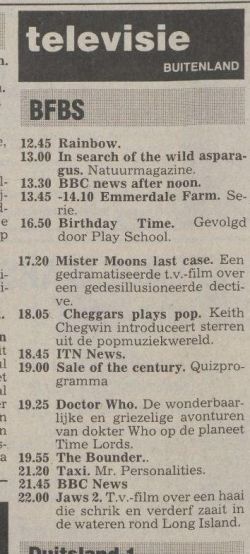
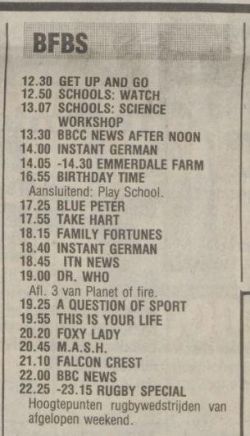
We do not have airdates for Season 19, but presumably it aired on BFBS Germany a few weeks after the UK screenings in early 1982.
We had more luck with Seasons 20 and 21, listings for which were located in online archived editions of the Dutch newspaper Limburgsch Dagblad / Limburgs Dagblad, which carried schedules for a variety of UK, Dutch, Belgian and German TV stations.
Commencing with the 27 August 1982 issue, the publication included BFBS listings. (Although the BFBS signals had been available in the Netherlands for some time, the Dutch papers had not been permitted to publish BFBS listings; they were only granted permission to do so by SSVC in August 1982.)
The first Dutch newspaper billing for Doctor Who on BFBS-TV was on Saturday, 26 February 1983, at 6.40pm; this would be for Arc of Infinity, eight weeks after the UK. The subsequent listings all had varying timeslot of 6.40, 6.45, 7.05, 7.10 and 6.55pm.
The final listing was on 9 July 1983, at 6.55pm. But that is a run of only 20 weeks, which means two episodes are unaccounted for. Unfortunately, none of the listings gave story titles, so we cannot determine what the 'missing' episodes would be. (None of the listed timeslots ran for longer than 25 minutes, which means there were not any instances of more than one episode screening on the same day.)
The usual Doctor Who slots on the Saturdays prior to 26 February, and those after 9 July are filled by other programmes, so at a guess, it would appear that The King's Demons 2-parter didn't screen on BFBS. There was likely a problem during the recording of one or both episodes in London which prevented the story being available to the BFBS.
Alternatively, Doctor Who did screen the two weeks prior to 26 Feb or after 9 July, but that the published listings for those days are incorrect.
Five months later, the series made a one-off re-appearance on Friday, 30 December 1983; no story title is given, but the newspaper's brief synopsis (in Dutch) refers to "the planet of the Time Lords", so this must be The Five Doctors.
But the printed timeslot was only half an hour: 19.25 to 19.55. The programme that followed - The Bounder - was only a 25 minute show, and yet the published slot for that was 19.55 to 21.20pm (1hr 25m), It's far more likely here that "19.55" is a printing error, and that the time that Doctor Who ended and The Bounder commenced was supposed to be "20.55".
Season 21 commenced on Thursday, 2 February 1984 at 7.05pm, only four weeks after the UK. Like the UK screenings, this run was shown twice a week on BFBS, with the second weekly episode playing on Fridays. The first four timeslots were either 7.05 or 7.15pm, whereas from 16 February, the slots for both days of the week became fixed at 7.00pm. The Dutch newspaper printed story titles for some of these listings.
There were no episodes on Friday 9 or 16 March, since Resurrection of the Daleks had played in the UK as two double-length instalments one per week, so the BFBS schedules had to skip two Friday slots. The story aired on BFBS in its original 2x45-minute version.
The final episode - which would have been The Twin Dilemma part 4 - aired on 27 April 1984.
PETER DAVISON TRANSMISSION SUMMARY
- Season 19: would have been recorded off-air in London from 4 January to 30 March 1982; BFBS airdates unknown. BFBS became part of the SSVC during this time
- Season 20: was recorded off-air from 3 January 1983, and a shorter 20-episode run aired on BFBS 26 February to 9 July 1983 (The King's Demons was skipped)
- The Five Doctors: was recorded off-air on 25 November 1983; BFBS screened it on 30 December 1983
- Season 21: was recorded off-air from 5 January to 30 March 1984; BFBS screened it from 2 February to 27 April 1984
It's possible that these episodes were also seen on BFBS Cyprus, but we have not been able to confirm this.
COLIN BAKER
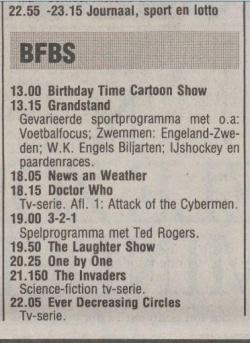
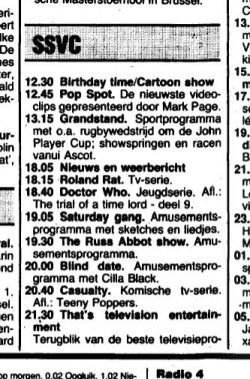
WEST GERMANY
Colin Baker's first story The Twin Dilemma was screened by BFBS in West Germany as part of season 21 from 19 to 27 April 1983 (see above).
His first full season as the Doctor commenced on the BFBS from Saturday, 13 April (a sizeable gap of nearly four months after the UK screening) and ended on 13 July 1985, in a varying timeslot ranging from 6.15pm to 7.45pm. (No episode screened on 27 April to make way for the A Song for Europe presentation for Eurovision 1983, which was being held in and broadcast from Munich.) All 13 episodes were 45 minutes in length.
Season 23 commenced on Saturday, 18 October 1986 (six weeks after the UK), at 5.40pm. It ran without interruption until 17 January 1987; timeslots varied, with 11 episodes airing at 6.40pm. All bar the first episode was identified by title in the newspaper, with 11 of them featuring the "deel" (part) number.
FALKLAND ISLANDS?
With regular TV transmissions from RAF Mount Pleasant Airfield not commencing until 4 December 1986, it's unknown whether Doctor Who was included in the first batch of video tapes supplied to the airbase on the Falkland Islands. Newspapers could not be sourced for airdates.
COLIN BAKER TRANSMISSION SUMMARY
- The Twin Dilemma; was recorded off-air from 22 to 30 March 1984; BFBS screened it from 19 to 27 April 1984
- Season 22: was recorded off-air from 5 January to 30 March 1985; BFBS Germany showed it from 13 April to 13 July 1985
- Season 23: was recorded off-air from 6 September to 6 December 1986 (the BBC had by this time taken over ITV's contract to record and supply tapes); BFBS Germany screened it from 18 October 1986 to 17 January 1987. With BFBS-TV commencing on the Falklands in December 1986, it's possible that this season was the first to be shown on the islands; airdates unknown
It's likely that this run of Colin Baker stories was also shown by BFBS Cyprus, but we have no listings to confirm if this was the case.
(The sixth Doctor reappeared on TV in Germany ten years later, when VOX aired a run of dubbed Colin Baker stories from 7 February 1995.)
SYLVESTER McCOY
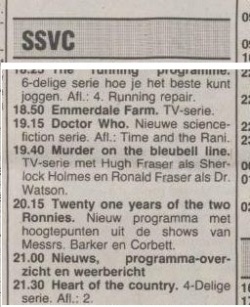
WEST GERMANY
The seventh Doctor arrived on BFBS Germany from Tuesday, 20 October 1987, at 7.15pm (seven weeks after the UK). The second episode aired at 8pm, but the remaining 12 played at the fixed time of 7.25pm. The 14th and final episode aired on 19 January 1988.
The programme's 25th anniversary season began seven weeks after the UK, on Thursday, 17 November 1988 at 7.20pm. The next four episodes also played at that time. There was no episode on 22 December (to allow for an instalment of Coronation Street - which is ironic given that the Street aired opposite Doctor Who in the UK!). The final episode for the year (The Happiness Patrol part 1) was on 29 December 1988 at 6.20pm.
The series then shifted to Fridays for the next episode on 6 January 1989 (with The Happiness Patrol part 2), where it remained in a fixed 7pm slot until the run concluded on Friday, 24 February 1989. (Only the 1989 episodes had story titles published (in English) in the Dutch newspaper.)
In August 1989, Sylvester McCoy and producer John Nathan-Turner visited West Germany on a publicity tour (McCoy was photographed climbing the still intact Berlin Wall). This trip was primarily to promote the recent sale of his stories to German station RTL-Plus, and as far as we can tell, did not also involve any publicity for BFBS / SSVC.
Season 26 commenced only three weeks after the UK screenings, from Wednesday, 27 September 1989 at 6.40pm, where it stayed for the first five weeks. From 1 November, the slot shifted to the slightly earlier time of 6.15pm for the remainder; the run concluded on 27 December 1989.
FALKLAND ISLANDS
The earliest available listing for Doctor Who in the Falkland Islands appears in the issue of Penguin News covering the final two weeks of December 1988.
On Saturday, 24 December 1988, Doctor Who aired from 7.40pm. This would be Season 25. No story title was given. The following week, 31 December, the series aired at the earlier time of 6pm.
The next available paper was that for 28 January 1989 (with the show now in a 6.30pm slot), and the final untitled listing was in the paper for 11 March 1989 (also at 6.30pm). These dates have a 12-week spread, which means the 25th series started on 10 December, 17 December or 24 December, and ended on 11 March, 18 March or 25 March 1989.
We can therefore extrapolate what episodes were on for the four newspapers we have: 24 and 31 December are Remembrance of the Daleks 1, 2 or 3; 28 January is either The Happiness Patrol 2 or 3, or Silver Nemesis 1; while 11 March is The Greatest Show in the Galaxy 2, 3 or 4.
The next available Island listing for Doctor Who is on Thursday, 11 November 1989. This newspaper finally gave a story title: "Ghost Lights" [sic], at 6.30pm. Only three further papers were available, and each of them had a story title: 23 November and 7 December 1989 both had "The Curse of Fenric", and 21 December 1989 said "Survival New" [sic], which has to be part 1.
From these we can easily work out when the series started and ended; the 14-episode season commenced on 5 October 1989 (a month after the UK, and eight days after BFBS Germany), and concluded on 4 January 1990.
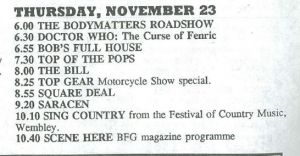 The Curse of Fenric part 1, 23 November 1989; Falkland Islands - Penguin News |
SYLVESTER McCOY TRANSMISSION SUMMARY
- Season 24: was recorded off-air from 7 September to 7 December 1987; started on BFBS Germany on 20 October 1987 and ended on 19 January 1988. It would have been shown on BFBS Falklands soon after; airdates unknown
- Season 25: was recorded off-air from 5 October 1988 to 4 January 1989; it started on BFBS Germany on 17 November 1988, and on BFBS Falklands starting a few weeks later, sometime during early December 1988
- Season 26: was recorded off-air from 6 September to 6 December 1989; BFBS Germany airdates were 27 September to 27 December 1989; the season started on BFBS Falklands on 5 October 1989
It's likely that McCoy's stories were also shown on BFBS Cyprus, but we have no listings to confirm if this was the case.
(Sylvester McCoy returned to German airwaves, when local station RTL Plus commenced dubbed editions of Sylvester McCoy stories from 22 November 1989. Coincidentally, between that very date and 27 December 1989, McCoy episodes played on two different channels in West Germany for six weeks: RTL Plus was playing Season 24, while BFBS was screening Season 26!)
And as noted above, from late 1993 until circa 1996, Sophie Aldred was a part-time host on the BFBS programme "Children's SSVC", which screened weekday afternoons, and the actor attended the annual Rhine Army Summer Show in May 1994.
Fate of the 1970s / 1980s Tapes
The BFBS was contractually obligated to ensure that after transmission all tapes were sent back to the London Control Centre to be wiped and reused. The tapes used in West Germany and the Falklands were routinely shipped back to the LCC.
In the early-1990s, Adam Lee, the BBC's archive selector at the time, contacted the BFBS in search of missing programming, and was informed by the Service that they had wiped and disposed of all their quad tape holdings only two weeks earlier. This mass disposal would have been soon after November 1991, which was when SSVC in Chalfont replaced JHQ Rheindahlen as the system input point; with all programmes being transmitted live from the UK to Germany and elsewhere by satellite, the now-surplus library of used quad video-tapes was no longer needed.
But even if there had still been Doctor Who recordings held, there would not have been any missing episodes. But it's possible that editions of "Take Five" featuring Pertwee and Baker (if they had been recorded and preserved) were destroyed at this time.
Doctor Who in the 1990s / 2000s / 2020s
30 Years in the TARDIS
The 50 minute documentary celebrating the series' 30th anniversary aired on the BBC on 29 November 1993. This was recorded, and supplied to the BFBS.
The documentary would likely have been available in West Germany "live" on the BBC rather than delayed.
The special was shown by BFBS Falkland Islands seven weeks later, on Wednesday, 12 January 1994, from 8.10 to 9pm -- the Penguin News called it "Dr Who: Thirty Years in the Tardis".
One can only wonder what the residents thought of this celebratory item, given that only the Colin Baker and McCoy stories had been shown on the islands.
PAUL McGANN
The TV Movie was transmitted by the BBC on 27 May 1996. It would have been seen on BFBS in Germany "live" from the direct feed. (The archived collection of Limburgsch Dagblad stopped at the end of 1995, so no clipping for the movie is available.)
The TV Movie was shown from video tape on BFBS Falkland Islands on Saturday, 22 June 1996; the "one off feature" aired from 7.35 to 9pm.
Other Repeats?
There were no listings in Penguin News for any of the BBC Repeats of older Doctor Who stories that aired on BBC1, BBC2 and BBC4 during the 1990s and 2000s, so it's unlikely these were seen in either the Falklands or Germany.
Listings could also not be found for any of the other "specials" that had aired on the BBC -- such as "Resistance is Useless" (1992) and the Doctor Who Night (1999); it would appear that 30 Years in the TARDIS was the only one-off that did make it to the Falklands. (Or if they were shown on the Islands, the issues of Penguin News with those listings are ones missing from the archived collection.)
THE NEW SERIES
The Christopher Eccleston episodes of the new series of Doctor Who were available on the BFBS Germany and BFBS Navy services soon after the UK transmissions - the final episode of Series 1, "The Parting of the Ways", aired on 23 July 2005, with a repeat in October. The service's station had been renamed BFBS-1 a few years earlier.
On the Falklands, ahead of the new series starting, the island station screened the 10 minute short "Some Things You Need to Know About Doctor Who" (hosted by Jon Culshaw) on Sunday, 27 March 2005 (at 5.15pm), then again on Wednesday, 29 March (at 8.20pm). And "The Story of Doctor Who" was shown the following day, Monday, 28 March from 7.25pm. (Both these items had aired on BBC2 on 19 March 2005.)
On Sunday, 10 April at 3.05pm, the documentary "Doctor Who: A New Dimension" was screened (recorded from BBC1 on 26 March 2005). Four hours later, "Rose", the first episode of the new series, was shown on the Islands at 7pm. All subsequent new episodes were shown weekly on that day at that time.
David Tennant's first story, The Christmas Invasion, was shown by some BFBS stations on 25 December 2005, with a repeat the following day. The tenth Doctor made his debut on the Falkland Islands station on Sunday, 16 April 2006 at 7.05pm.
All subsequent episodes of the new series of Doctor Who plus its spin-offs Torchwood, The Sarah Jane Adventures, Doctor Who Confidential and Totally Doctor Who were shown on the BFBS-TV services.
THIS WEEK IN DOCTOR WHO
FORCES TV (2022)
The SSVC's specialist channel FORCES TV (on satellite Sky 181, Virgin 274, Freeview / YouView 96 and Freesat 165) commenced a twelve story / 51 episode run of classic Doctor Who starting from Tuesday, 15 February 2022.
Forces TV won't play black and white programmes, so that means no Hartnell or Troughton. The selected stories will therefore feature Jon Pertwee, Tom Baker, Peter Davison, Colin Baker and Sylvester McCoy only.
The 51 episode run will include:
- Spearhead from Space (4)
- The Daemons (5)
- Genesis of the Daleks (6)
- Terror of the Zygons (4)
- The Robots of Death (4) #
- City of Death (4) #
- Logopolis (4) #
- Kinda (4) #
- Earthshock (4) #
- The Caves of Androzani (4) #
- Vengeance on Varos (4 part version) #
- Remembrance of the Daleks (4) #
In the case of the eight stories marked "#", these will in effect be 'repeats', since they had previously been shown on the old BFBS / SSVC network back in the 70s and 80s.
Some of the episodes were edited for content rather than timing (Forces TV aired commercials); for instance, Remembrance of the Daleks 2 was missing the scene where Ace finds the "No Coloureds" sign; and The Robots of Death part 3 lost a short moment of strobe-lighting.
Two episodes aired back to back in each timeslot, of which there were three per day. For example, on the first day, 15 February, Spearhead from Space part 1 aired at 7.55am, followed by part 2 at 8.30am. Those two episodes aired again at 1.25pm / 1.55pm, then for a third time at 8.15pm / 8.50pm. Parts 3 and 4 aired 16 February, 7,55am / 8.30am, again at 1.30pm / 2.00pm / and 8.15pm / 8.50pm.
Those three timeslots were (mostly) consistent throughout the full run, with the odd shift by five minutes from time to time – e.g. 8.00am rather than 7.55am, 1.30pm instead of 1.25pm, 2.00pm not 1.55pm.
At the weekends, stories were repeated again – Spearhead from Space (all four parts) on Saturday, 19 February starting at 11.25am, then again from 11.10pm, ending early morning Sunday, 20 February. Later that same morning, The Daemons 1 and 2 aired...
The episodes then went into a repeat loop, initially screening six days a week (not Fridays) during March, then only on the weekends starting in April…
The final Doctor Who story to air was Earthshock, on Sunday, 26 June 2022.
On 30 June 2022, ForcesTV ceased broadcasting, having lost its channel slot on Freeview.
TV listings
| ← AIRDATES ...... (CLICK ICON TO GO TO TABLE SHOWING EPISODE BREAKDOWN AND AIRDATES - N/S = story title is Not Stated) |
The BFBS's own weekly TV listings publication was called VIEW. We were only able to locate two editions of this: the very first issue, which had the TV schedules for just the first two days of broadcast (18-19 September 1975), plus the 23-29 October 1976 issue. Only the latter had a billing for Dr Who (for The Masque of Mandragora).
The British Military newspaper Sixth Sense also published TV listings for BFBS-TV in Germany, but no issues of this publication could be accessed. (We did find a source in the UK that had an almost full run of issues for 1979 to 1987, but due to COVID-19 restrictions, we have not yet been able to view these papers. Hopefully, if/when restrictions ease, and public access to the archive can resume, we will follow up with this line of research.)
The 1980s West Germany listings come from the Dutch newspaper Limburgsch Dagblad (Limburg Daily), which is available online. Limburgsch was only permitted by the SSVC to include listings for BFBS from 27 August 1982 onwards -- too late for Season 19. While the text was in Dutch and could be easily translated, some of the listing details and story titles were actually in English.
For the 1984 run, the Thursday episode billing was usually always "Dr Who", while the Fridays episodes were usually always "Doctor Who" in full.
Some of the episodes were numbered with the word "deel", which is Dutch for "part". There were also some odd spellings, such as "Vengeance on Pharos" [sic], and "Delta & The Bannerman" (singular) for all three episodes.
Where we could, we also cross-checked the airdates with the few available online issues of the weekly US military newspaper the Berlin Observer which provided listings for the US AFRTS / AFN-TV station in West Berlin. From early 1985 (the exact date is unknown), the Observer began to include untitled listings for BFBS-TV. (And they matched!)
The Falkland Islands airdates are from Penguin News, an irregular community newspaper, the publication of which was taken over by the local government in March 1989. (Issues from the Jane Cameron National Archives are online HERE.) Weekly SSVC/BFBS TV schedules first appeared in the December 1988 pre-Christmas issue of Penguin News, so only the final two McCoy seasons, 30 Years in the TARDIS, the McGann TV Movie and the New Series had published listings. The series was called Doctor Who, and the four McCoy listings in 1989 all had story titles.
Media
There are some interesting BFBS / SSVC items on YouTube, including This is BFBS Television, a 1983 documentary produced by LWT (look out for the very brief appearance by Jon Pertwee at 9m6s!), and the BFBS 40th Anniversary special, both of which provided much of the history detail in this profile. Note: None of these clips has Doctor Who content.
|
|
|
|
|
|
|
|
|
|
|
|
|
|
|
|
|
|
- Bibliography:
- VIEW - The Official Journal of BFBS, issue #1, 18-19 September 1975
- VIEW - The Official Journal of BFBS, issue #59, 23-29 October 1976
- "Television for the British troops in West Germany", Television, the Journal of the Royal Television Society, March/April 1980
- A Microphone and a Frequency: Forty Years of Forces Broadcasting, Doreen Taylor, William Heinemann Ltd, 1983
- This is BFBS Television, LWT, 1983
- This is the British Forces Network, Alan Grace, Alan Sutton Publishing Ltd, 1996
- Penguin News (from the Jane Cameron National Archives), 1979-1996
And with grateful thanks to Alan Grace, Mike and Fran Bennett, Steve Roberts, Jeff Moody, John Leeson and Sophie Aldred
